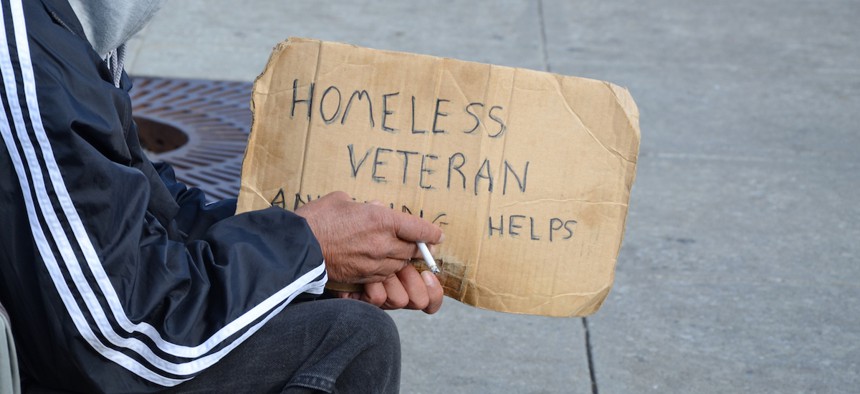Tech helps New Jersey house unsheltered veterans

Solange_Z via Getty Images
More than 30,000 U.S. veterans were unsheltered last year. New Jersey is turning to a cloud-enabled platform to streamline and expedite efforts to get veterans in the state housed.
The number of unhoused veterans in the nation has steadily decreased over the last decade. Since 2010, the estimated number of veterans without a home has declined by 55%, and last year saw the fewest number of veterans experiencing homelessness at 32,882 since 2019, according to federal data.
But the nation’s progress to house former servicemembers is still far from over, as more than 13,800 people still experienced unsheltered homelessness last year, living in areas like parks, abandoned buildings and sidewalks.
New Jersey is one of several states aiming to address homelessness among veterans. In March, the Garden State announced the launch of its $30 million Bringing Veterans Home initiative, which aims to reduce veteran homelessness in the state to “functional zero” by July 1, 2026, through collaboration with state agencies, nonprofits and veteran service organizations.
Part of that goal includes housing 300 veterans within 180 days of the announcement, state officials said. To get there, New Jersey is turning to tech to improve interagency collaboration and information sharing.
“Success—housing every former servicemember and National Guardsmen—requires collaboration," said Mike Callahan, director of the Office of Homelessness Prevention at the Department of Community Affairs in New Jersey, in an email to Route Fifty. “It is non-negotiable.”
The state is leveraging an operations platform from Civic Roundtable to help carry out its mission to house veterans, which entails expediting the processing of rental assistance vouchers, monitoring real-time housing placement rates and conducting community outreach, among other efforts.
The web-based application is hosted on AWS GovCloud and functions like an online forum to allow users to ask each other and answer questions about housing policies, form requirements and other housing-related issues, said Madeleine Smith, co-founder and CEO of Civic Roundtable. It’s also a “knowledge base” where users can query questions like how to complete certain tasks “like a Google search,” she explained.
“Every organization has its own systems, like document repositories. But none of these systems talk to each other,” Callahan said. “So public servants can end up spending a lot of time trying to find the right resource or trying to find the right person to answer their question.”
The platform “sits horizontally across all involved organizations, so we can securely integrate data from our systems into one platform,” he explained. “Now, if someone wants to find a document, they search in one place. If they have a question, they post it, and peers can provide answers.”
Roundtable also reduces the need to rely on emails or social media posts to share program information, which Callahan said can often impede coordination among shelters, housing navigators and other frontline service providers.
Callahan pointed to a recent case in which a BVH provider needed to find an emergency hotel placement for an unhoused individual. The process would typically require a chain of calls or emails, elongating the person’s time remaining unsheltered, but the Roundtable platform enabled providers’ to navigate and coordinate resources in real time, “allowing a quicker response but also a team-based approach that really moves the needle with what we're doing through BVH,” he said.
The platform also helps staff more efficiently prepare downstream resources like permanent housing voucher programs and housing stabilization resources to accelerate housing outcomes beyond emergency shelter services.
Bringing Veterans Home “isn't just about providing housing—it's about fundamentally transforming how we serve veterans experiencing homelessness across our state,” Callahan said. “By bridging jurisdictional boundaries, eliminating service gaps, and creating dedicated pathways to permanent housing, we're building a system that ensures no veteran or National Guard member in New Jersey will have to wonder where they'll sleep at night.”






